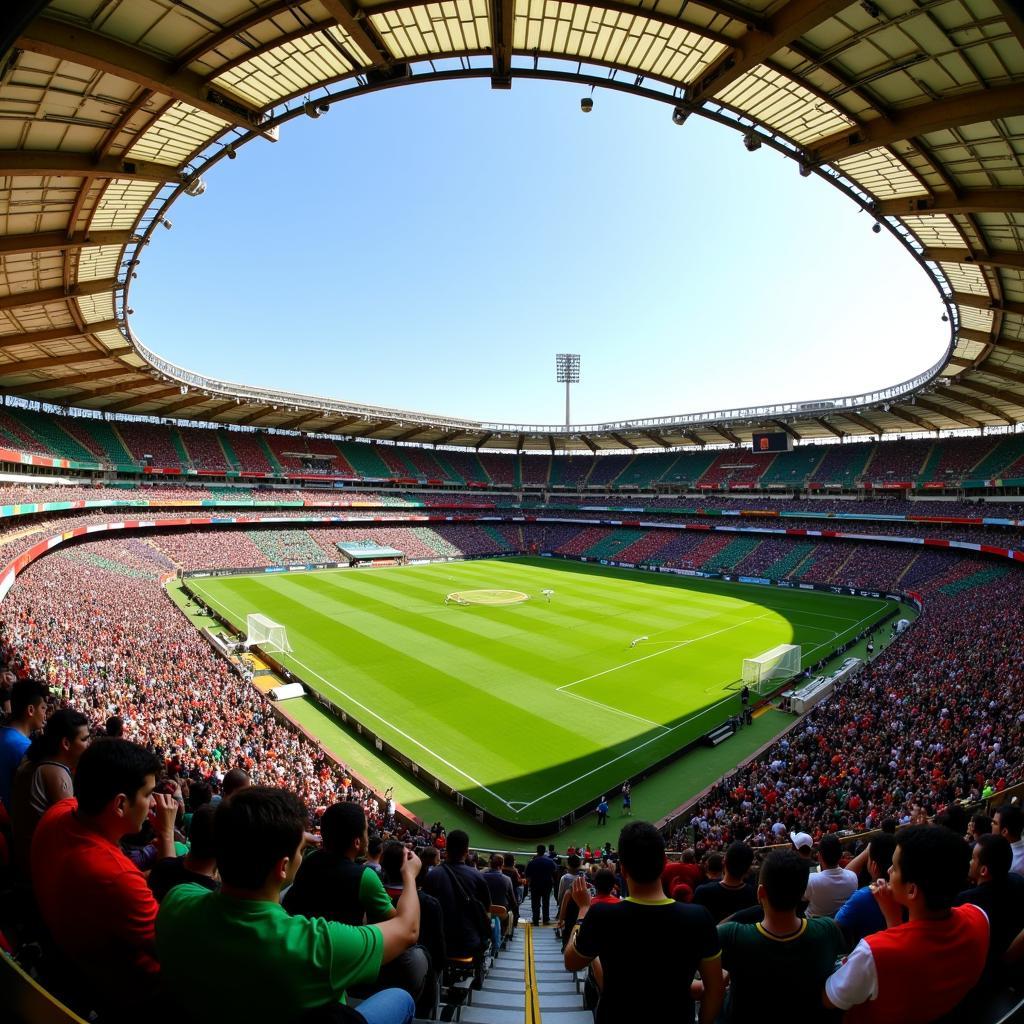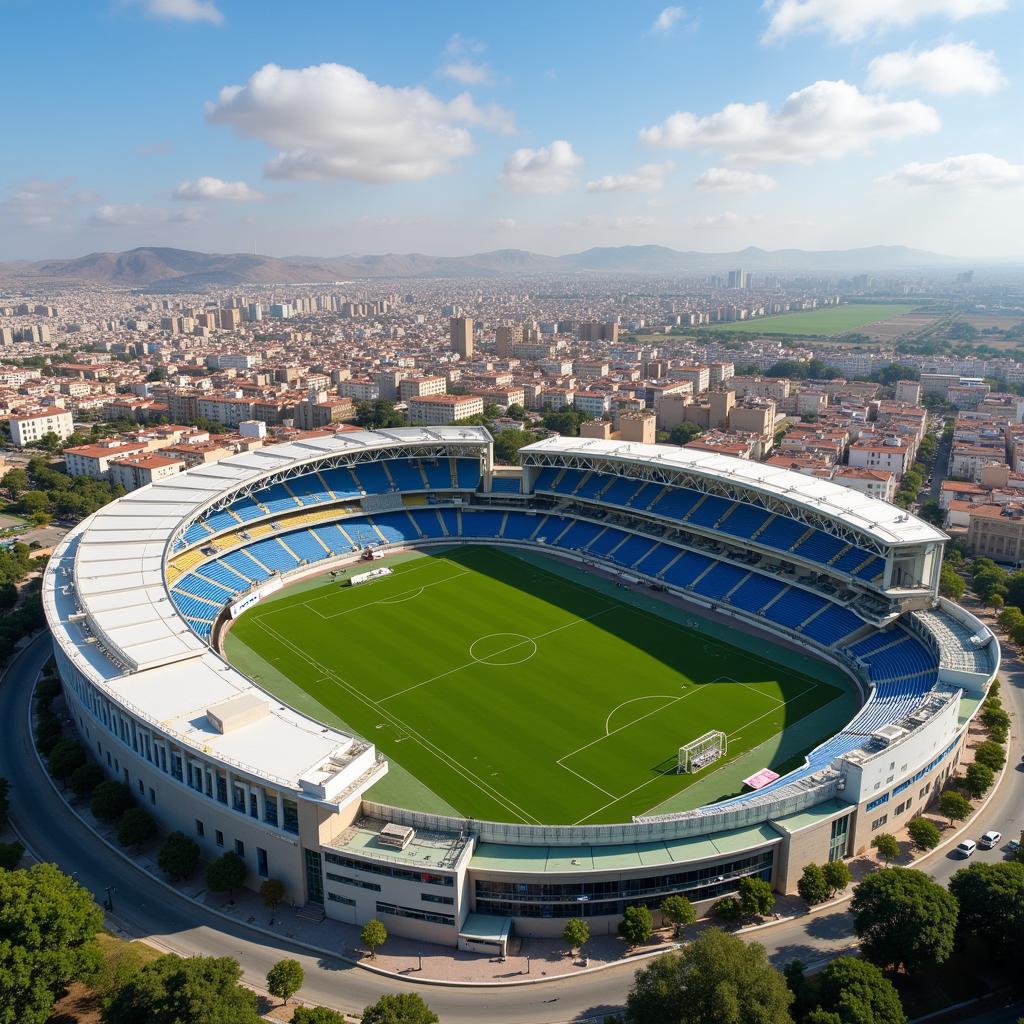Exploring the African Cup Venue: A Journey Through History and Culture
The African Cup of Nations, often referred to as AFCON or the African Cup, is a prestigious football tournament that unites nations across the continent. A crucial aspect of the tournament is the African Cup Venue, a topic we’ll explore in depth in this article. Understanding the selection process, the historical significance of past venues, and the impact on local communities reveals a fascinating story that goes beyond the game itself.
The African Cup of Nations isn’t just about the beautiful game; it’s a celebration of culture, a showcase of national pride, and a testament to the power of sport to unite people. Choosing the African football cup venue is a complex process, influenced by factors such as stadium capacity, infrastructure, political stability, and economic considerations. Let’s delve into the history and impact of these chosen locations.
A Look Back at Iconic African Cup Venues
Over the years, numerous countries have had the honour of hosting the African Cup, each leaving its mark on the tournament’s rich history. From the bustling stadiums of Cairo to the vibrant atmosphere of Accra, each venue has contributed to the unique tapestry of AFCON. Remembering these past hosts offers valuable insight into the evolution of the tournament.
The Significance of Location
The selection of an African Cup venue is more than just logistics; it’s a symbolic act that acknowledges a nation’s contribution to African football. The chosen country becomes the epicentre of continental football, drawing fans and media from all corners of the globe.
 Cairo International Stadium: A Historic African Cup Venue
Cairo International Stadium: A Historic African Cup Venue
For example, when South Africa hosted the 2013 African Cup of Nations, it marked a significant moment for the country, showcasing its post-apartheid progress and its capacity to host a major international event. The tournament also provided a substantial economic boost to the local communities.
The Impact of the African Cup Venue on Local Communities
Hosting the African Cup of Nations brings numerous benefits to the host nation, particularly the local communities surrounding the chosen venue. The tournament stimulates economic growth through tourism, infrastructure development, and job creation. Moreover, it fosters a sense of national pride and unity, bringing people together in their shared love for the sport.
Economic Benefits and Infrastructure Development
The influx of tourists and media personnel during the tournament generates revenue for local businesses, from hotels and restaurants to transportation and souvenir shops. The need to upgrade existing infrastructure or build new facilities creates job opportunities and leaves a lasting legacy for the community long after the final whistle has blown.
 Accra Sports Stadium: Vibrant Atmosphere at the African Cup
Accra Sports Stadium: Vibrant Atmosphere at the African Cup
“Hosting the African Cup of Nations is a catalyst for development,” says Dr. Abiola Irele, a renowned economist specializing in African development. “The investment in infrastructure and the increased tourism revenue can have a transformative impact on local communities.”
Social and Cultural Impact
Beyond the economic benefits, the African Cup also has a profound social and cultural impact. It provides a platform to showcase the host nation’s culture and traditions to a global audience, promoting cultural exchange and understanding. The shared experience of supporting their national team fosters a sense of unity and national pride among citizens. Seeing the African football champions league results certainly adds to the excitement!
What Factors Determine the African Cup Venue?
Several factors come into play when selecting an African Cup venue. Stadium capacity, infrastructure, and accessibility are crucial considerations. The political stability and security of the host nation are also paramount. Finally, the financial capacity of the host country to undertake the necessary preparations plays a significant role.
Stadium Capacity and Infrastructure
The chosen stadium must have a sufficient capacity to accommodate the large crowds expected at AFCON matches. Adequate infrastructure, including transportation networks, accommodation facilities, and medical services, is also essential. Check the African Cup of Nations fixtures pdf for more details.
“The stadiums chosen for the African Cup are symbols of national pride,” says Kwame Nkrumah, a sports journalist specializing in African football. “They represent the aspirations of a nation and the passion of its people for the beautiful game.”
 Casablanca Stadium: Modern Infrastructure for the African Cup
Casablanca Stadium: Modern Infrastructure for the African Cup
Political Stability and Security
A stable political environment and robust security measures are essential for the safety and well-being of players, officials, and fans attending the tournament. This is why countries experiencing political unrest or security challenges are often overlooked as potential hosts. You might also be interested in the African games morocco.
Conclusion
The African Cup venue plays a pivotal role in the success of the tournament. From its historical significance to its impact on local communities, the chosen location becomes more than just a playing field; it transforms into a symbol of African unity, cultural expression, and the power of sport to inspire. Understanding the intricacies of the African Cup venue selection process reveals a deeper appreciation for the tournament and its profound impact on the continent. Want to catch the action on TV? Look up the African Cup of Nations 2017 on tv.
FAQ
- How often is the African Cup of Nations held? Typically every two years.
- Who decides the African Cup venue? The Confederation of African Football (CAF).
- What are the criteria for selecting a venue? Stadium capacity, infrastructure, political stability, and security.
- What are the benefits of hosting the African Cup? Economic growth, infrastructure development, and cultural promotion.
- How does the African Cup impact local communities? It creates jobs, boosts tourism, and fosters national pride.
- What are some of the most iconic African Cup venues? Cairo, Accra, and Johannesburg.
- How can I find more information about past African Cup venues? Check out official CAF resources and sports news websites.
Need support? Contact us 24/7: Phone: +255768904061, Email: [email protected], Address: Mbarali DC Mawindi, Kangaga, Tanzania.
